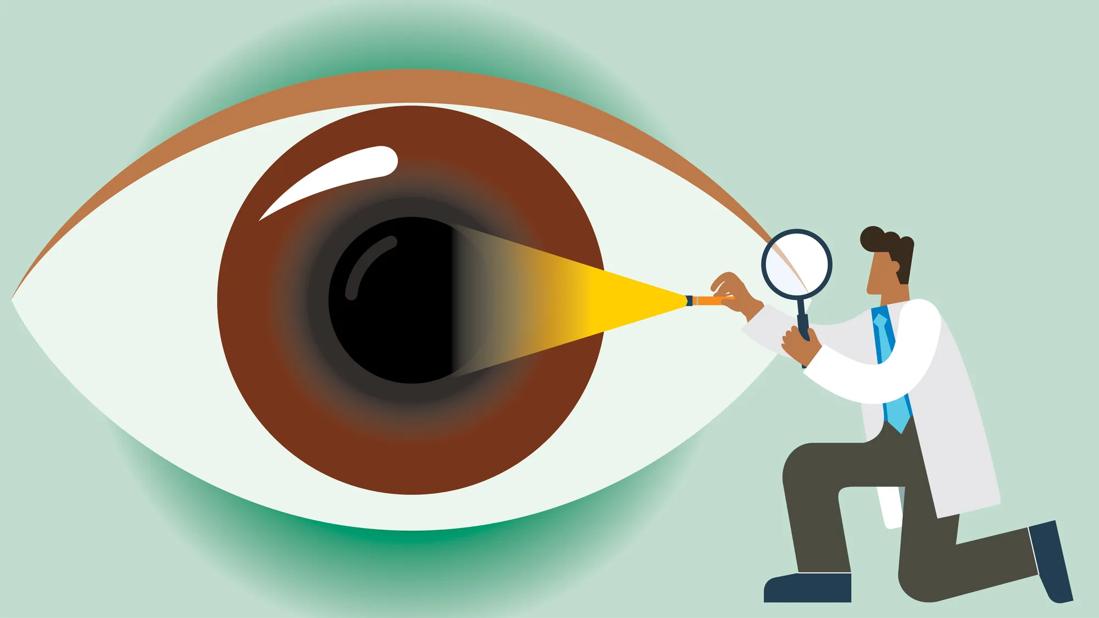Having a first-degree biological relative with this eye condition raises your risk, but other factors are at play, too

Image content: This image is available to view online.
View image online (https://assets.clevelandclinic.org/transform/dc99e664-f01c-47cf-89a4-38afcdfbd455/doc-examines-eye-1445158946)
Eye doctor examines oversized eye with big magnifying glass and flashlight
Having a family history of macular degeneration significantly raises your risk of developing it yourself.
Advertisement
Cleveland Clinic is a non-profit academic medical center. Advertising on our site helps support our mission. We do not endorse non-Cleveland Clinic products or services. Policy
“There are some risk factors for developing macular degeneration that we cannot modify, and one of those factors is genetics,” confirms ophthalmologist and retina specialist Aleksandra Rachitskaya, MD.
The answer to this question isn’t as simple as “yes” or “no.” Macular degeneration is a type of eye disease that can be inherited. But not everyone who develops it has a family history of it — and not everyone with a family history develops it.
“We know that there’s a genetic component to macular degeneration, but it’s not a single gene. So, if your parent has it, that doesn’t mean that you definitely will,” Dr. Rachitskaya explains. “It just means that it’s a significant risk factor.”
It’s also worth noting that the words “hereditary” and “inherited” are often used incorrectly to mean “a family history.” But hereditary and inherited conditions are those that are specifically related to your genes. Family history includes other factors, too, like whether you and your relatives have similar lifestyle habits that could raise your risk.
In the case of macular degeneration, there’s likely a strong genetic component, but other factors play a role, too. In other words: Though anyone can develop macular degeneration, your risk is higher if it runs in your family — and that’s at least in part due to your genes.
Advertisement
Family history is a risk factor for all types of macular degeneration, but the most common type is called age-related macular degeneration (AMD) — which, as its name suggests, is more common with age. You’re 12 times more likely to develop AMD if you have a first-degree biological relative (that is, a parent, sibling or child) with the condition.
According to the American Ophthalmology Association (AAO), more than 30 genes may be associated with an increased risk of developing macular degeneration.
“But just because someone in your family has AMD doesn’t mean you will, too,” Dr. Rachitskaya reiterates. “There are a number of other factors at play, too.”
Non-age-related macular degeneration (NAMD) is much less common than AMD. Some versions, like Stargardt disease, are solely due to genetics. Others can be the result of eye trauma, nutritional deficiencies or nearsightedness.
Talking to your biological family members about their health history is the best way to learn what conditions you’re at risk for, including macular degeneration. But for a variety of reasons, not everyone has that option.
So, what about genetic testing? Right now, no type of gene therapy can help prevent or manage AMD, so the AAO doesn’t recommend genetic testing for it. That means the only way to know that you’re at a higher genetic risk for the condition is to know that you have a family history of it.
But whether or not you know your family history, the best thing you can do to lower your risk is to adopt certain lifestyle habits that have been shown to have an impact.
“We can’t control our genes, and we can’t control our age,” Dr. Rachitskaya emphasizes. “But other risk factors for macular degeneration are more within our power to try to manage.”
If someone in your family is diagnosed with macular degeneration, it’s smart to take steps to try to minimize your own risk. Start here:
Advertisement
Taking these intentional precautions can go a long way toward preventing AMD or keeping it from getting worse.
“It can be very scary to learn that you or someone else in your family has AMD,” Dr. Rachitskaya acknowledges. “But with early intervention and the right treatments, this condition can be very manageable.”
Advertisement

Sign up for our Health Essentials emails for expert guidance on nutrition, fitness, sleep, skin care and more.
Learn more about our editorial process.
Advertisement
Eating a balanced diet can help protect your eyes and may prevent AMD from progressing
They may help, but it depends on factors like the stage of your disease
A low-vision evaluation can help identify your best options
A decrease in visual signals to your brain can lead to seeing things that aren’t really there
A loss of central vision might complicate things behind the wheel
Wet age-related macular degeneration is rarer and always advanced
Act quickly by locating the object, gently removing the debris and flushing your eye
High cholesterol can be genetic, but testing and treatment can lower your heart disease risk
Although it could be used as a moisturizer, this new trend is not recommended
Communicating clear limits helps protect your time, energy and emotional well-being
High cholesterol can be genetic, but testing and treatment can lower your heart disease risk